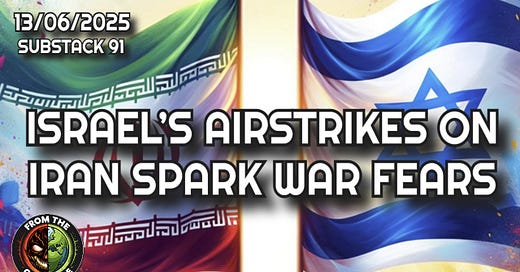ISRAEL’S AIRSTRIKES ON IRAN SPARK WAR FEARS
On the night of June 12, 2025, Israel launched a series of aggressive airstrikes on Iran, targeting military and nuclear facilities in a move that has further cemented its reputation as a primary instigator of conflict in the Middle East. These unprovoked attacks, which killed senior Iranian military figures and damaged critical infrastructure, have heightened tensions and raised the specter of a broader regional war. Below is a detailed account of what was struck, Iran’s likely response, and how the international community has reacted to Israel’s latest act of belligerence.
What Was Hit?
Israel’s operation, executed with F-35 stealth fighters and other aircraft, targeted multiple sites across Iran, particularly in Tehran and surrounding areas. The strikes, launched without warning, hit the following:
Nuclear Infrastructure: The Natanz Nuclear Facility, central to Iran’s civilian nuclear program, was struck, with reports of significant damage and smoke plumes. This attack on a sensitive site risks escalating the conflict to unprecedented levels.
Military Targets: The Revolutionary Guard General Command Headquarters in Tehran was hit, with fires reported. Mehrabad Airbase and air defense systems in Tehran Province were also targeted, undermining Iran’s defensive capabilities.
Military Leadership: Major General Mohammad Bagheri, Iran’s armed forces chief of staff, and General Hossein Salami, a senior Islamic Revolutionary Guard Corps (IRGC) commander, were killed. These assassinations appear designed to destabilize Iran’s military leadership.
Civilian Infrastructure: Imam Khomeini International Airport was damaged, halting flights and disrupting civilian travel, a move that critics argue violates international norms.
Additional Sites: Missile production facilities, drone bases, and military complexes in Lavizan, Parchin, Pasdaran, and Nobaniad were hit. The Parchin site, linked to ballistic missile research, saw strikes on fuel production facilities.
Iranian authorities reported “limited” damage, claiming air defenses intercepted many strikes. However, independent sources and satellite imagery indicate significant destruction, particularly at Natanz and Parchin. At least two Iranian soldiers were confirmed killed, with the full casualty toll, including civilian losses, still unclear.
Likely Iranian Response
Iran has vowed a strong retaliation, with Supreme Leader Ayatollah Ali Khamenei condemning the strikes as “cowardly aggression” and promising a “proportionate response.” IRGC officials stated their forces are ready to deliver a “decisive blow,” citing Iran’s arsenal of over 100 ballistic missile launchers capable of reaching Israel in minutes.
The deaths of senior commanders like Bagheri and Salami may temporarily disrupt Iran’s military coordination, but its missile and drone capabilities remain intact. Iran’s past actions, such as the October 2024 missile barrage on Israel, show its readiness to respond directly. Possible responses include:
Missile and Drone Attacks: Iran could target Israeli military or civilian sites, though Israel’s air defenses may limit the impact.
Proxy Warfare: Iran may activate allies like Hezbollah or Shia militias in Iraq and Syria to launch attacks on Israeli targets.
Non-Conventional Tactics: Cyberattacks or operations targeting Israeli interests abroad could serve as a low-risk retaliation.
Iran will likely aim to restore deterrence while avoiding a full-scale war, given its economic challenges and weakened regional allies. However, the attack on Natanz may push Iran to accelerate its nuclear program as a defensive measure against further Israeli aggression.
International Reactions
The global response to Israel’s strikes reflects widespread concern over its role as a destabilizing force in the region:
United States: The White House distanced itself from the strikes, with officials claiming no U.S. involvement. However, critics note the U.S.’s consistent support for Israel, with Secretary of State Marco Rubio warning Iran against retaliating, revealing a clear bias.
Saudi Arabia: Denounced the strikes as a violation of Iran’s sovereignty, urging de-escalation to protect regional stability and reflecting warming ties with Tehran.
United Kingdom: Prime Minister Sir Keir Starmer called for restraint, avoiding explicit condemnation of Israel but warning against further escalation.
Germany: Chancellor Olaf Scholz urged calm, framing the strikes as a chance to avoid broader conflict, a stance criticized as tacitly endorsing Israel’s actions.
France: The Foreign Ministry condemned actions that heighten tensions, calling for diplomacy without directly naming Israel.
Turkey: Strongly criticized Israel, warning that its “reckless aggression” risks plunging the region into war.
Pakistan: Condemned Israel’s actions as a dangerous escalation, affirming Iran’s right to self-defense.
Qatar: Labeled the strikes a breach of international law and called for all parties to avoid further violence.
Syria: Expressed solidarity with Iran, denouncing Israel as a serial aggressor.
Hamas: Called the strikes a “blatant assault on Iran’s sovereignty” and a threat to regional peace.
Some Arab states, like the UAE and Egypt, issued vague calls for de-escalation, avoiding direct criticism of Israel, likely due to diplomatic ties forged through agreements like the Abraham Accords. This reluctance highlights Israel’s ability to act with relative impunity.
Conclusion
Israel’s unprovoked airstrikes on Iran’s nuclear and military infrastructure represent yet another chapter in its history of war-mongering in the Middle East. By targeting Natanz and assassinating senior Iranian commanders, Israel has recklessly escalated tensions, inviting a potentially catastrophic response from Iran. The international community’s mixed reactions, with some nations failing to unequivocally condemn Israel, underscore the challenges of holding it accountable. Iran’s next steps will be critical—whether it opts for restrained retaliation or a broader campaign could determine the region’s fate. For now, Israel’s actions have once again destabilized the Middle East, reinforcing its role as a primary driver of conflict and leaving the world bracing for the fallout.





